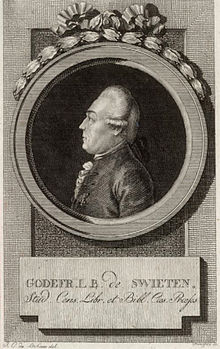| Der Messias | |
|---|---|
| Oratorio by George Frideric Handel, arranged by W. A. Mozart | |
 Gottfried van Swieten, for whose Academies the arrangement was made | |
| Catalogue | K. 572 |
| Year | 1789 |
| Related | Messiah |
| Text | translation by Friedrich Gottlieb Klopstock and Christoph Daniel Ebeling |
| Based on | compilation of biblical texts by Charles Jennens |
| Movements | 38 in three parts |
| Scoring |
|
Der Messias, K. 572, is Wolfgang Amadeus Mozart's 1789 German-language version of Messiah, George Frideric Handel's 1741 oratorio. On the initiative of Gottfried van Swieten, Mozart adapted Handel's work for performances in Vienna.
The libretto of Mozart's adaptation was largely based on Luther's translation of the Bible. Mozart re-orchestrated about three-fifths of Handel's composition, primarily providing additional parts for an extended section of wind instruments, which was called Harmonie at the time. In general, a half-century after the inception of the work, Mozart adapted an English-language work conceived for a baroque orchestra in a public venue, to accommodate the constraints of private performances and the musical tastes of Vienna.
Mozart's arrangement, first published in 1803, was instrumental in making Messiah Handel's most widely known oratorio. However, the adaptation has had few supporters amongst Mozart or Handel scholars.